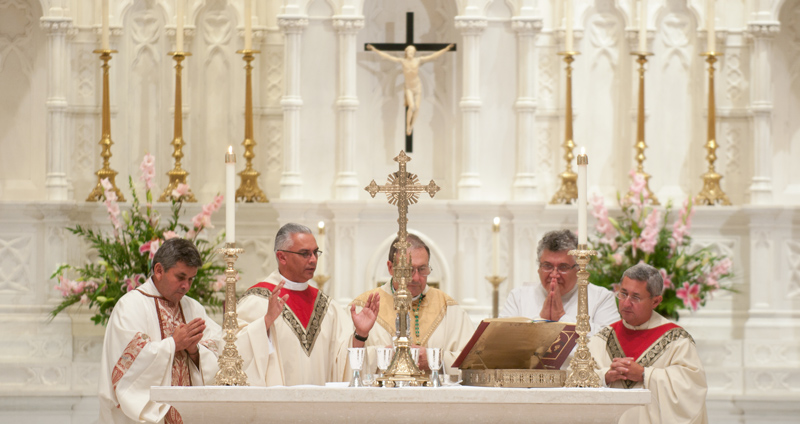
CHARLESTON—Prayers, songs and passionate words about God in Spanish and English rang through meeting rooms at the Francis Marion Hotel on King Street as Hispanic clergy met here recently.
The National Association of Hispanic Priests held its annual conference Aug. 31 to Sept. 3 focusing on “Family: Strength of the Priest.”
The event drew 85 priests from an estimated 82 dioceses around the country and overseas. They came from a wide range of backgrounds and home nations, including Mexico, Peru, El Salvador, Colombia and Cuba.
 The priests were united by their language of Spanish and the common purpose of bringing the Gospel to diverse groups of people.
The priests were united by their language of Spanish and the common purpose of bringing the Gospel to diverse groups of people.
They prayed and attended Mass together daily. Archbishop Jose H. Gomez of Los Angeles celebrated Mass Sept. 1 at Blessed Sacrament Church in Charleston. On Sept. 2, Bishop Robert E. Guglielmone celebrated Mass for the priests at the Cathedral of St. John the Baptist.
Many of the conference workshops focused on the role of family in the life of a priest. The men discussed the challenges of ministering to families in the parish setting and the impact family had in their own lives.
During one emotional panel discussion Sept. 2, several priests talked about how hard it was to be far from family members in other countries. They related ways their ministry has taught them how precious families are, and described the challenges of reconciling personal emotions with daily pastoral duties.
Father Leonardo Medina of the Diocese of Tulsa spoke about his father’s death 18 months ago and said he was thankful he was able to rush home to Mexico to be with him before he died.
“After having that experience, I feel I can better understand and help parishioners who are going through something like that,” Father Medina said. “I also realized how important family is. You always have to remember where you come from, no matter where you end up. Thanks to my parents, I became the priest I am today.”

Father Jose Morales of the Diocese of El Paso said his father died shortly after he was ordained to the transitional diaconate, and then he lost a brother after being ordained to the priesthood.
“As a priest I felt I had to be in charge of the community in my parish, and I couldn’t give myself permission to mourn my brother,” he said. “I officiate at funerals all the time, but it took a while for me to give myself time to mourn my brother and cry for him. I had to realize that I am a priest, but I also have permission to feel both the pain and happiness of life as it comes along.”
Father Morales said he recently presided at his grandmother’s funeral and was asked by a cousin how he could handle something so difficult.
“I had to stop and think and then I thought about the responsibilities I have to my family and my parish, to do the things I need to do,” he said. “Being part of the priesthood, we all go through the same things. I always go back to the fact that we are part of our own families and the family of the priesthood. We need to be strong not only for our own family, but for Christ’s family who we serve.”
At other workshops during the week, the clergy learned about ways to combat the loneliness and depression priests sometimes experience. They also brainstormed ideas for coming up with effective ministry to Hispanic families.
Piarist Father Rafael Capo, executive director of the Southeast Pastoral Institute in Miami, gave a presentation about the United States Conference of Catholic Bishops’ ongoing study of the needs of Hispanics in the United States. He said the process has taken place in a series of “encuentros”, or meetings, which started in the 1970s and continue today.
“Pope Francis is calling all of us to be missionary disciples, and Hispanics are a bigger part of the U.S. population than ever before,” he said. “We need to develop a new generation of pastoral and parish leaders to respond to the needs not only of Hispanics, but the rest of the Church.”
He said the main goal of the encuentros is to find new ways to evangelize and encourage the laity to take a greater role in parish and community leadership. The current round of meetings will culminate in 2019 with an updated pastoral plan.

